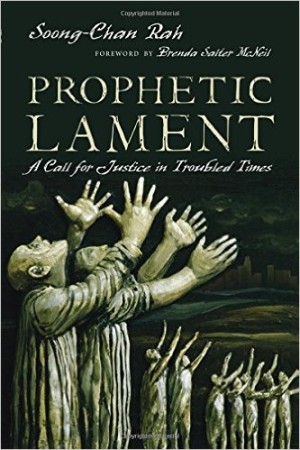Review of Prophetic Lament: A Call for Justice in Troubled Times
Posted on October 13, 2015 by PLT Staff
 The American church avoids lament. The theological and ministerial power of lament is minimized, and the underlying narrative of suffering that requires lament is lost. But absence doesn’t make the heart grow fonder, according to Soong-Chan Rah. Absence makes the heart forget.
The American church avoids lament. The theological and ministerial power of lament is minimized, and the underlying narrative of suffering that requires lament is lost. But absence doesn’t make the heart grow fonder, according to Soong-Chan Rah. Absence makes the heart forget.
Prophetic Lament suggests lament as a counter to both the triumphalistic and nihilistic narratives that pervade the American evangelical church. Rah suggests the need for a new language and skills to lament the complex social and racial issues that face American society—and the church—today, beginning with the ability to confront our own culpability in these corporate sins and failures. Rah offers not only a thorough interpretation of the often-overlooked Book of Lamentations, but draws on this text to call the American evangelical church to lament its own history of racism and sexism. As Rah concludes, “Lamentations provides a necessary corrective to the triumphalism and exceptionalism of the American evangelical church arising from an ignorance of a tainted history” (198).
Lament is not a call to withdraw from the realities of living in cultural exile, but a counternarrative to the church’s culturally-captive narrative that allows it to confront its own culpability in slavery, segregation, and sexism and open itself up to the voices of those often marginalized. From critiquing models of “incarnational ministry” to megachurch celebrity culture, Rah contends that a new ministry imagination seeks not to offer a hand out or a hand up, but partnership with the other on the other’s terms.
This book “offers us the theological tools and practical insights to develop a prophetic imagination that envisions and advocates for the world as God intended it to be.”[1] The book concludes with a reflection and lament for the tragic, racialized events in Ferguson, and beyond, and the ensuing movement for black dignity those events animated.
[1] Brenda Salter McNeil from the “Foreword” of Prophetic Lament.
- Paper Information
- Author: Kristopher Norris
- Creation Date: October 2015
- PDF: View / Download File »
